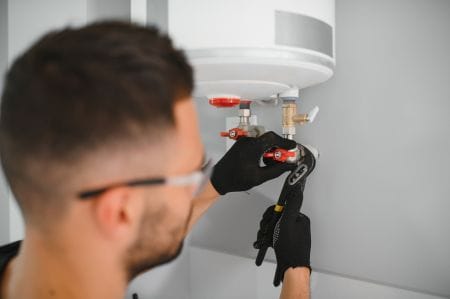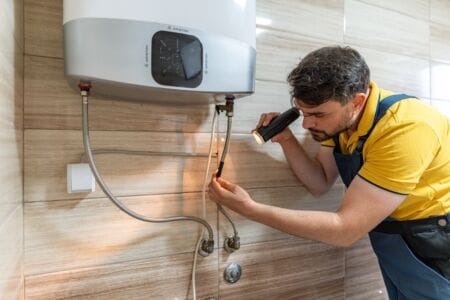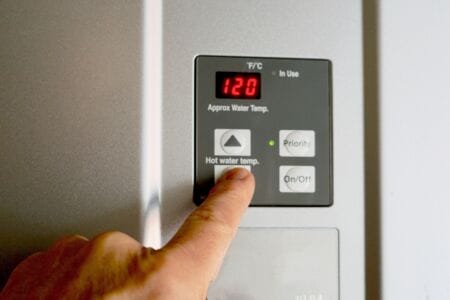Contents
ToggleWhat we'll cover...
An overview of contemporary and classic heating styles, with an exploration of the most popular trending designs.
Vintage and contemporary heating head to head
Some interior design debates never die – open shelves vs cupboards, carpet vs hardwood, and now: modern vs traditional heating.
Nowadays, radiators aren’t just practical appliances to heat your home. They’re also design statements. And with more choice than ever, the decision between sleek contemporary lines or time-honoured classics isn’t as simple as “which is the cheapest?” or “what fits best?”. It’s about style, efficiency, and personality.
So, which radiator aesthetic comes out on top this year? Is the clean, contemporary look the way forward? Or is heritage-inspired heating still holding its ground? Do you need to consider different seasonal radiator styles and how to accentuate winter heating, for instance?
Let’s break it down – modern vs traditional heating, category by category, with no punches pulled.
Style and aesthetic
Modern heating: Clean, confident and minimal
Modern radiators are all about streamlined silhouettes, subtle details and bold finishes. Think flat panels, vertical columns, and slimline electric radiator models that hug the wall like they’re part of the architecture.
You’ll see:
- Matte black, anthracite, and soft neutral tones
- Sculptural forms and geometric shapes
- Seamless integration into minimalist interiors
Best for: New-builds, open-plan living spaces, Scandi-inspired homes, and interiors that place an emphasis on balance and simplicity.
Traditional radiators: Character, craft and curve appeal
Traditional radiators offer serious period charm. Think multi-column cast iron radiator styles, ornate fixtures, and soft curves that nod to Victorian, Edwardian or farmhouse aesthetics.
You’ll see:
- Brushed brass or aged finishes
- Chunky silhouettes that feel solid and grounded
- Perfect symmetry in a classic frame
Best for: Heritage homes, country cottages, and any space where timeless detail and warmth go hand in hand.
Verdict: Draw
Modern wins for sleekness. Traditional wins for character. Your décor style, home layout and personal preference decides the champion here.
Function and flexibility
Modern radiators: Slim, smart and space saving
Modern heating isn’t just stylish, it’s clever as well. Vertical radiators help maximise wall space, electric heaters require no pipework, and designer shapes can turn a radiator into a functional art piece.
You get:
- Zonal heating options
- Compatibility with smart thermostats
- Wall-hugging designs for tight spaces
Bonus: Modern electric radiators are perfect for renovations and retrofits where new pipework just is not the ticket.
Traditional radiators: Steady and built to last
Traditional column radiators, especially in cast iron, take longer to heat up – but they will retain their warmth for much longer in turn. That ensures a gentle, lasting heat perfect for rooms that require steady comfort as opposed to on-demand bursts.
They’re also:
- Built from high-quality, heavy-duty materials
- Ideal for long-term energy efficiency if used correctly
- Surprisingly flexible when powder-coated in contemporary tones
Verdict: Modern edges ahead
With smart heating integration and versatility, modern heating gets the win. That said, traditional still packs a punch if you value long-lasting warmth and solid construction.
Comfort and heat output
Modern systems: Fast, responsive heating
Electric panel radiators and flat panel radiator designs heat up rapidly and respond instantly to automated smart control commands. Perfect for busy households where comfort needs to be immediate and flexible.
- Ideal for zonal heating and on/off scheduling
- Quick to warm, great for reactive use
- Perfect for rooms that need heat on demand (home offices, guest bedrooms etc.)
Traditional systems: Deep heat that lasts
Although cast iron column radiators are undoubtedly slower starters, once they’re warm, they’re warm. These radiators emit a more radiant, ambient heat, which can feel cosier and less dry than that provided by a contemporary alternative.
- Ideal for rooms used frequently and consistently (living rooms, dining rooms)
- Their significant weight facilitates heat retention for longer periods
- Creates a more atmospheric warmth that people feel, don’t just measure
Verdict: Depends on the room
Modern heating wins for responsiveness. Traditional wins for depth and consistency. Why not mix and match?
Installation and maintenance
Modern radiators: Quick and clean
Modern radiators – especially electric ones – often come pre-filled and don’t require plumbing for a successful installation. They’re perfect for DIY fittings, extensions, or areas that central heating setups can’t reach.
- Easily wall mountable
- Simple maintenance
- Smart tech is built in, reducing the need for extra kit
Traditional radiators: Retro and robust
Installing traditional column radiators takes more planning, especially so in period properties where existing pipework might need to be altered. Disruptive fitting notwithstanding, they’re also typically much heavier, and can require more upkeep over the years.
- Weight can be a challenge on weak walls
- Requires more robust valves and brackets
- Ideal for ground floors and solid-wall installs
Verdict: Modern wins hands down
If ease and flexibility matter, modern radiators are the no-brainer. They simplify the installation process and negate the cost of potentially expensive plumbing work in tow.
Energy efficiency and sustainability
Modern heating: Built for 2025 and beyond
With Lot 20 compliance, smart controls, and lower flow temperatures, modern radiators – especially electric and aluminium radiator models – are far better suited to today’s sustainability goals.
- Compatible with smart thermostats and zoned systems
- Perfect for renewable-powered homes
- Highly controllable = less waste
Traditional heating: Slower but smarter than you think
While they might not scream efficiency, traditional column radiators, and particularly those with a cast iron construction, retain heat incredibly well. Used properly, they can offer excellent efficiency as it relates to thermal mass, holding on to heat and releasing it slowly.
That said:
- They aren’t always Lot 20 compliant
- They don’t rapidly respond to smart commands
- Best used in a well-insulated, consistently heated home
Interior design trends: What's hot in 2025?
If cutting carbon is the main priority, modern heating is built for the future. But don’t count traditional out completely. When used right, they’re surprisingly sustainable.
Modern radiators are:
- Being integrated into wall panelling for a seamless, blended aesthetic
- Featured in matte black, anthracite, and brushed metals
- Used as vertical art-style pieces in minimalist spaces
Traditional radiators are:
- Popping up in modern colours – pastel blues, blush pink, olive greens, as demonstrated in our coloured radiators collection
- Styled with contemporary fixtures to bridge old and new
- Reappearing in retro and maximalist interiors where detail is king
Trend insight: 2025 is all about hybrid design – mixing the old with the new. So don’t be afraid to combine styles across different rooms. Think: a modern heated towel rail in the bathroom, a classic column radiator in the hallway, and a coloured designer piece in the lounge.
Modern or traditional heating in 2025?
The truth is, there’s no universal winner, because your heating style should match your home, your lifestyle, and your taste.
- Modern radiators offer a greater level of flexibility, smarter tech, and streamlined styling. They’re a brilliant pick for new-builds, renovations and homes aiming for energy efficient performance.
- Traditional radiators deliver charm, character, and an irresistible feeling of nostalgic comfort. They work brilliantly in heritage spaces or interiors that embrace design storytelling.
Further insights can be derived from our guides on the biggest home heating trends for 2025, and the best radiator styles for modern interiors, whilst there’s handy hints on how to stay warm without turning up the thermostat and much more in the BestHeating Advice Centre.
Explore an excellent array of both modern and traditional heating styles from BestHeating, and be sure to let us know which side of the fence you land on in the comments below, or through Instagram, Facebook or X.
John is a Research Specialist for the Best Heating Advice Centre, where for over nine years he has dedicated himself to demystifying home heating for our customers. He specialises in creating clear, data-driven guides and how-to articles by collaborating directly with our team of certified heating experts and product engineers.
His work, built on a foundation of journalistic research, has helped millions of readers make confident and informed decisions about their home heating. When he’s not breaking down the heat output differentials from radiators to heated towel rails, John fancies himself as a fine football and music connoisseur.







